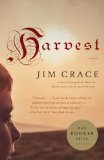Summary | Excerpt | Reviews | Beyond the Book | Readalikes | Genres & Themes | Author Bio

Here's what took place. This is my reckoning, calculated without recourse to any constable or magistrate— and just as well, because this place is too far off from towns to number such judicious creatures among our livestock; we are too small, and getting smaller. Our final day of harvesting was not as joyful as it ought to have been, and not only because the crop proved so frugal in the ear. A gentleman we did not recognize was watching us reduce our barley field to stub; a visitor, a rare event, exciting and unnerving. We mowed with scythes; he worked with brushes and with quills. He was recording us, he said, or more exactly marking down our land, at Master Kent's request. He tipped his drawing board for anyone that asked and let them see the scratchings on his chart, the geometrics that he said were fields and woods, the squares that stood for cottages, the ponds, the lanes, the foresting.
He was a pleasant man, I'd say. No more than thirty years of age and dressed much like the master, not for labor but for the open air, in sturdy boots, breeches, a jerkin, and a plain cap without feather, brooch or badge. His beard was shaped and honed to a point with wax. I have a narrow trowel that matches it. A townsman's beard. A wealthy beard. And he was lopsided when he moved, with a stiff arm and shoulder on his left. His was a body not well suited to the balks and bumpy edges of a field. He was a stumbler. And there was, I thought, a trace of past illness in his expression as well as in his step. But I've never seen a man more ready with a smile. We could not help but stare at him and wonder, without saying so, if those scratchings on his board might scratch us too, in some unwelcome way.
Still, there was essential work to finish yesterday, whatever our distractions. If we hoped for sufficient grain to last the year, we'd have to deserve it with some sweat. This summer's yield was not yet good enough. Plenty, here, has wed itself to Leanness. At the lower, shaded limits by the dell and on the more neglected stony slopes our plants have proven miserly. They grew as short, askew and weakly as our limping visitor and so were hardly worth the reaping. But the higher field, which we left standing till the last, has always looked more sprightly— and more promising. Since spring we've waited with our fingers crossed as our better barley steadily renounced its green and let itself go tawny. From the lane, looking down toward the tracery of willows on the brook, the top end of our barley meadow, bristling and shivering on the breeze, showed us at last its ochers and its cadmiums, its ambers and its chromes. And the smells, which for so long in this slow summer were faint and damp, became nutlike and sugary. They promised winter ales and porridges. The awns and whiskers of the barley's ears were brittle and dry enough to chit- chat- chit every time they were disturbed, nattering with ten thousand voices at every effort of the wind or every scarper of a rabbit, mouse or bird. They said, "We've had enough. Our heads are baked and heavy now. We're dry. Bring out your blades and do your worst."
Reap and gossip. That's the rule. On harvest days, anyone who's got a pair of legs and arms can expect to earn supper with unceasing labor. Our numbers have been too reduced of late to allow a single useful soul to stay away. There's not a hand that will escape the brittle straw unscratched. The children go ahead of us, looking for the gray of any thistle heads that have outstripped our rust- gold barley, then duck below the level ears of grain to weed out nettles, teasels, docks; "dealing with the grievances," we say. The broadest shoulders swing their sickles and their scythes at the brimming cliffs of stalk; hares, partridges and sparrows flee before the blades; our wives and daughters bundle up and bind the sheaves, though not too carefully— they work on the principle of ten for the commons and one for the gleaning; our creaking fathers make the lines of stooks; the sun begins to dry what we have harvested. Our work is consecrated by the sun. Compared to winter days, let's say, or digging days, it's satisfying work, made all the more so by the company we keep, for on such days all the faces we know and love (as well as those I know but do not like entirely) are gathered in one space and bounded by common ditches and collective hopes. If, perhaps, we hear a barking deer nagging to be trapped and stewed, or a woodcock begging to make his hearse in a pie, we lift our heads as one and look toward the woods as one; we straighten up as one and stare at the sun, reprovingly, if it's been darkened by a cloud; our scythes and hand tools clack and chat in unison. And anything we say is heard by everyone. So there is openness and jollity.
Excerpted from Harvest by Jim Crace. Copyright © 2013 by Jim Crace. Excerpted by permission of Nan A. Talese. All rights reserved. No part of this excerpt may be reproduced or reprinted without permission in writing from the publisher.
Your guide toexceptional books
BookBrowse seeks out and recommends the best in contemporary fiction and nonfiction—books that not only engage and entertain but also deepen our understanding of ourselves and the world around us.